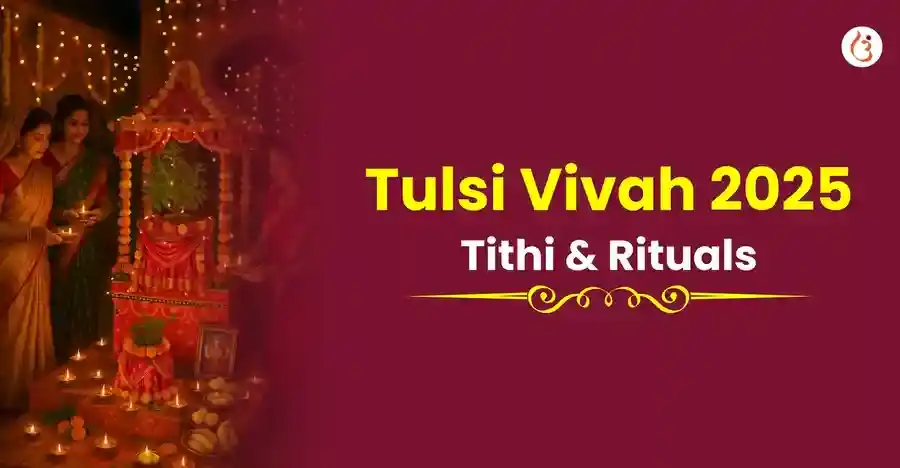Tulsi Vivah 2025: The Sacred Marriage of Tulsi and Lord Vishnu – Date, Story & Significance
गुरु - 30 अक्टू॰ 2025
3 मिनट पढ़ें
शेयर करें
Tulsi Vivah is the sacred wedding ritual between the Tulsi plant (Holy Basil) and Lord Vishnu (Krishna). This day celebrates the completion of the four holy months known as Chaturmas, during which marriages and other ceremonies are prohibited. It is a truly amazing festival which begins with Devutthana Ekadashi and ends with Kartika Purnima.
The Story Behind the Tulsi Vivah
This story is about Tulsi, who was once known as goddess Vrinda. Vrinda was a very devoted wife of Jalandhar, an asura. Vrinda was so devoted to Jalandhar that her love gave him power that was unmatched. He simply could not be conquered. In order to defeat Jalandhar and preserve the universe, Lord Vishnu had to use trickery to frighten Vrinda. He transformed himself into the form of Jalandhar, and with that, Vrinda's penance was broken, jeopardising the power she instilled in her husband. As she learned of Lord Vishnu's trickery, she became enraged and cursed him to become a black stone, also known as a Shaligram. After speaking the curse, Vrinda transformed into the Tulsi plant.
However, Lord Vishnu wanted to honour her deep love. So, He announced that the Tulsi plant would always be holy. He stated that Tulsi would always have a place as His worshipping spouse. For this reason, Tulsi Vivah is observed every year
Tulsi Vivah Date 2025
Date: 2nd November 2025.
Dwadashi Tithi Begins: 07:31 AM, 2nd November.
Dwadashi Tithi Ends: 05:07 AM, 3rd November.

Rituals of Tulsi Vivah
The Tulsi plant is cleaned, decorated with a saree, jewellery, bangles, and flowers, as the bride.
The Shaligram or Krishna idol is dressed as the groom.
The mandap (altar) is modest in size, and all traditional wedding customs are followed, such as kanyadaan and mangal pheras.
Devotees sing bhajans (religious songs) and recite mantras during the ceremony.
When the ceremony is completed, prasad is served in the form of sweets, fruits, and vegetarian dishes. The families share and enjoy it together.
Devotees light lamps around the holy Tulsi plant, and fast during the entire wedding ceremony.
Fasting is believed to bring good fortune and harmony in the family.
Spiritual Meaning of Tulsi Vivah
The celebration of Tulsi Vivah also represents purity, devotion, and divine sacred love. Tulsi is a living embodiment of human and divine oneness with nature. It is a service to honour the divine energies we experience in ourselves as we grow and change - it reminds us of the limitless power of true devotion - to transform even pain into spiritual growth.
The belief is that doing Tulsi Vivah at home will grant:
- Blessings of peacefulness and tranquillity in the home
- The husband-wife bond of trust and connectivity.
- Clear old bad karma or negativity from your last life.
- Blessings from Vishnu and Lakshmi.
If you are an unmarried devotee, it is suggested that once you join in the Tulsi Vivah, prosperity and good fortune will lead to finding your perfect partner.
Final Words
The unique event of Tulsi Vivah offers meaning beyond the ceremony—it serves as continuity in faith, purity, and the eternal connection of worshippers as devotees to their divinity. While the Tulsi plant is honoured each day, this special day celebrates the Tulsi goddess as the divine energy connection to humans. If performed on Kartika Purnima, Tulsi Vivah blesses a home and person with blessings, peace, and happiness.
शेयर करें